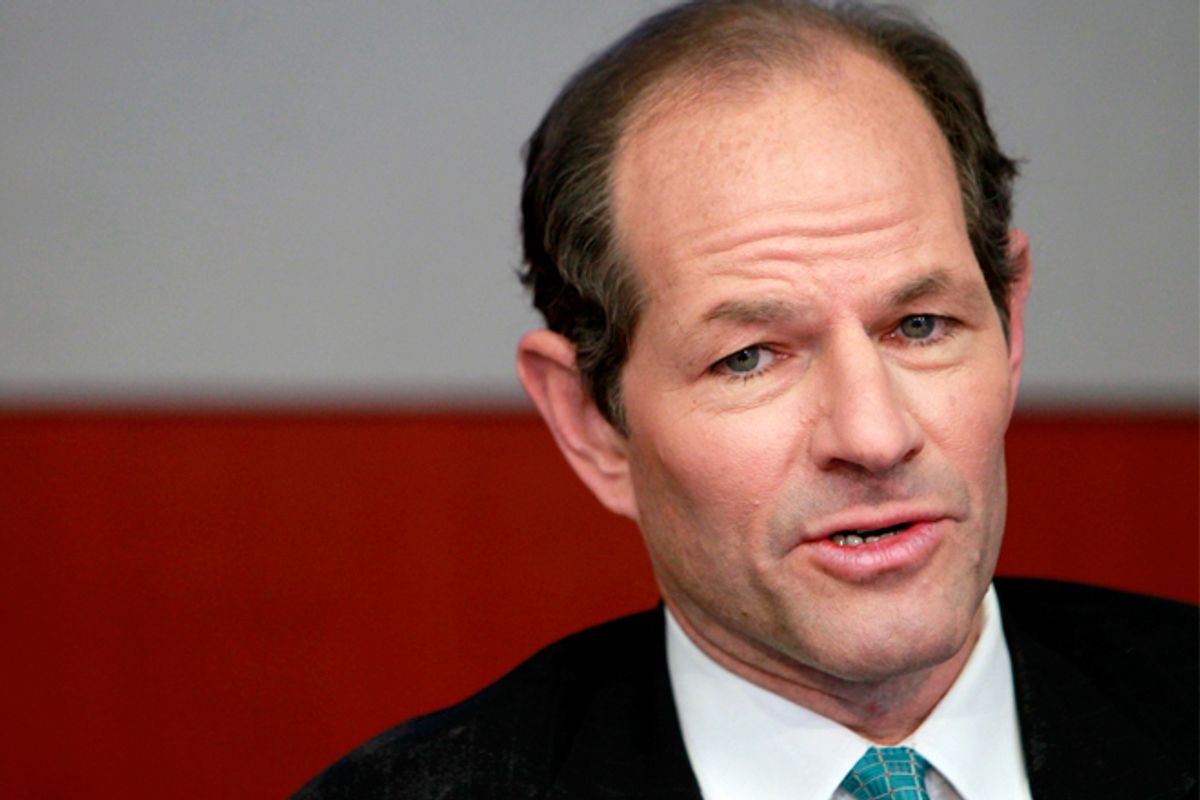Eliot Spitzer is back, officially. The New York Times reported yesterday that the former governor of New York will seek to become the comptroller of New York City. It is a bit of a demotion, politically, but when one is returning to politics after resigning in disgrace following a much-publicized sex scandal, one generally has to aim a bit lower than before. (With at least one current exception, which we'll get to shortly.)
Spitzer, as we all remember, was forced to resign as governor after it was revealed that he had enjoyed the company of prostitutes. Before then, he was in the process of having a disastrous and dysfunctional governorship, thanks to his abrasive personality and the unflagging venality and corruption of the New York state Legislature. Spitzer was perhaps one of New York's worst governors ever. That was largely because he had no clue how to deal with the political culture of Albany, and he presumptuously thought he wouldn't have to learn. He is more at home in New York City, and in a job where he isn't expected to have to "negotiate with" or "convince" anyone else of anything in order to accomplish things.
(It is kind of a shame for poor Scott Stringer, the current Manhattan borough president and front-runner in the comptroller's race, a nice guy with decent progressive credentials but much less money and name recognition.)
The Spitzer run has obviously led a lot of commentators to compare him to Anthony Weiner, a former member of Congress who resigned after he sexted some semi-strangers. Weiner laid low for a while and is now running for mayor. Its easy to imagine that Weiner's good poll numbers made Spitzer's decision easier. (Also maybe he saw Mark Sanford in the House and David Vitter in the Senate.) But while the two have some superficial similarities -- they are extremely outspoken Jewish New Yorkers whose sexual proclivities are far too well-known -- they are wildly different politicians, and Spitzer's road back to respectability won't be as easy as Weiner's.
Anthony Weiner's biggest enemies were the right-wing media. This was because he was a creature of the media. As a TV mouthpiece for "team progressive," he drew the ire of people like Andrew Breitbart, who conceive of politics as a war fought solely over control of the press. But because Weiner never accomplished anything in Congress, nor even ever really sought to accomplish anything, he never actually made any important enemies.
Spitzer, as anyone who's seen Alex Gibney's documentary on him knows, was not so lucky. He had actual political enemies. Some of them were quite powerful, well-connected and unscrupulous. Some (most) of them were quite wealthy. He made enemies because he used his power to advance a cause. While he was New York's attorney general, Spitzer zealously prosecuted white-collar crime. (His critics say he did so cynically, with his eyes on the governor's mansion, but even if it was cynical he was still at least prosecuting white-collar crime.)
Weiner isn't hated by anyone important. The tabloids consider him a figure of mirth, but as an outer-borough white-ethnic moderate, Weiner's really the sort of Democrat both tabloids find most agreeable. Spitzer is an avowed enemy of the right-wing Post, though, and always has been. Spitzer might've been better off announcing his decision after the papers went to press, saving himself at least one day's worth of front-page mockery. The Post practically leads with a joke about Spitzer's black socks, a bizarre and incredibly memorable minor detail from his prostitution scandal that also happens to have been probably invented by flamboyant dirty trickster Roger Stone.
The most important difference between Weiner and Spitzer is that only one of them actually cares about politics as something other than a popularity contest. After his premature retirement from politics, Spitzer, who is independently wealthy, didn't lay low or take a position at a law firm or a cushy consulting gig; he instead wrote a fairly wonky column for Slate. (He also tried to host some television shows but that didn't work out.) Weiner's big comeback Times Magazine piece was entirely about Weiner's personality, biography and ambition. Spitzer's Sunday night Times newspaper interview was about what he wants to accomplish as comptroller.
Anthony Weiner would like to be the next mayor, though he has not quite explained why. Spitzer would like to the be the next mayor's biggest pain in the ass. Traditionally, those seeking to be pains in the mayor's ass, before then attempting to become mayor themselves, have run for public advocate, a job with various somewhat amorphous duties mostly involving telling the press why the mayor is such a jerk. Spitzer has selected comptroller instead, because it's a finance position, and that's his specialty. Here's how he explained it to the Times:
Mr. Spitzer, who built a national reputation as a zealous watchdog of Wall Street while attorney general, imagines transforming the comptroller’s office into a robust agency that would not merely monitor and account for city spending, as it does now, but also conduct regular inquiries into the effectiveness of government policies in areas like high school graduation rates.
The return of Eliot Spitzer in full-on crusading asshole mode would be a good thing for the city, and for the Democratic Party in one of the country's biggest and most Democratic states. He at least pisses the right people off, unlike those avatars of elite interests Andrew Cuomo and Christine Quinn.



Shares